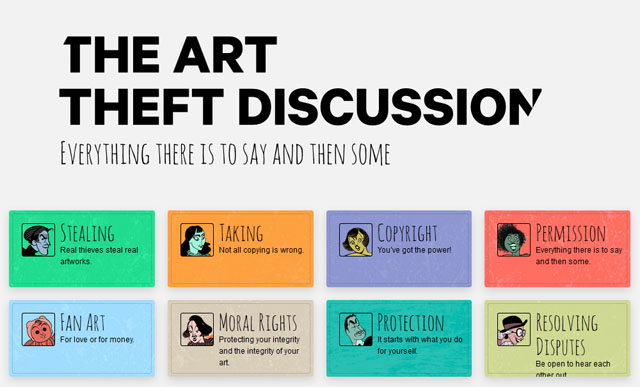 The art website Deviant Art has started a discussion on Art Theft with eight articles on Copyright infringement and related topics that effect digital artists on the internet. Based on the comments, the articles are extremely controversial, especially the one on Stealing, where they separate the concept of stealing from copyright infringement. I’m glad to see this. Copying may be wrong or even illegal, but it’s not stealing. Stealing is taking something away from someone. When a copy is made the person still has the original. If we’re going to build a future in our changing times where artists are paid and treated fairly, then we are going to have to start by being specific about what we are talking about. Words have meanings.
The art website Deviant Art has started a discussion on Art Theft with eight articles on Copyright infringement and related topics that effect digital artists on the internet. Based on the comments, the articles are extremely controversial, especially the one on Stealing, where they separate the concept of stealing from copyright infringement. I’m glad to see this. Copying may be wrong or even illegal, but it’s not stealing. Stealing is taking something away from someone. When a copy is made the person still has the original. If we’re going to build a future in our changing times where artists are paid and treated fairly, then we are going to have to start by being specific about what we are talking about. Words have meanings.
About 15 years ago the music industry went bananas over Napster and started the incessant drumbeat claiming that copying and stealing are the same thing. Now there is a generation of people who can’t tell the difference and I can see a lot of that in the angry comments on Deviant Art. But the music companies didn’t want to build a future for artists. They wanted everything to stay the same so they could keep their revenue streams. They just wanted people to stop copying so they came up with a dramatic short cut to re-frame the discussion and shut it down. Copying is stealing and that’s that. Well it’s not, and the reality is much more complicated.
And change isn’t going to stop either. As artists we need to take charge of this discussion because it’s up to us to build the future for ourselves. Let’s say what we mean and mean what we say, and not fall into the trap of using language that was designed to stop the discussion and stop change.